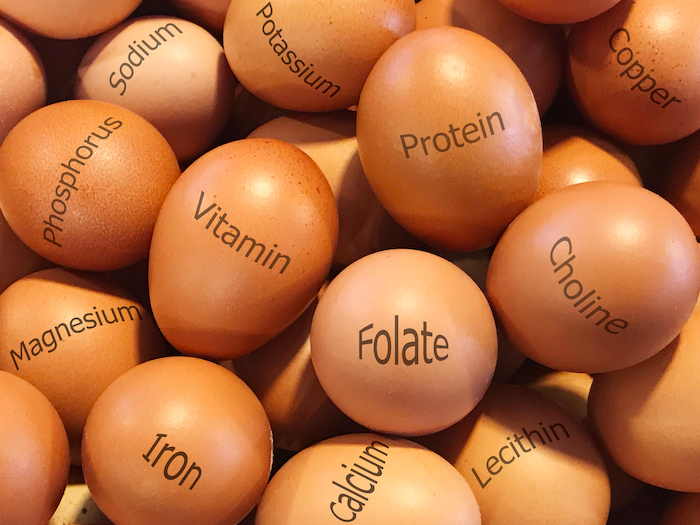 A new study by researchers at the University of Eastern Finland is the first to observe that dietary intake of phosphatidylcholine is associated with a reduced risk of dementia. Phosphatidylcholine was also linked to enhanced cognitive performance. The main dietary sources of phosphatidylcholine were eggs and meat. The findings were published in the American Journal of Clinical Nutrition.
A new study by researchers at the University of Eastern Finland is the first to observe that dietary intake of phosphatidylcholine is associated with a reduced risk of dementia. Phosphatidylcholine was also linked to enhanced cognitive performance. The main dietary sources of phosphatidylcholine were eggs and meat. The findings were published in the American Journal of Clinical Nutrition.
Choline is an essential nutrient closely related to the B complex family of vitamins. Choline is found in all living cells, and is known to play a vital role in maintaining the central nervous system and in numerous metabolic functions. Foods highest in choline include egg yolks, liver, meats, brewers yeast, milk, legumes and whole grain cereals.
Choline is also a component of lecithin, used in the manufacture of cell membranes. It is also required for the production and metabolization of fats and cholesterol, and helps to protect the liver from the accumulation of excess fatty deposits. Choline’s most vital role may lie in its activity in the brain and central nervous system. Choline is a precursor of the important neurotransmitter acetylcholine, a chemical used in the transmission of brain impulses between nerves, muscles and organs. In this role it is involved directly with cognition, long and short term memory, stimulus response, and mental energy.
Since acetylcholine levels increase rapidly after consuming choline, researchers have studied choline supplements in the treatment of various disorders marked by lowered levels of acetylcholine in the brain, including Huntington’s disease, Parkinson’s disease, Alzheimer’s disease, and tardive dyskinesia.
Previous studies have linked choline intake with cognitive processing, and adequate choline intake may play a role in the prevention of cognitive decline and Alzheimer’s disease. In fact, choline is nowadays used in a multinutrient medical drink intended for the treatment of early Alzheimer’s.
The new study now shows that the risk of dementia was 28% lower in men with the highest intake of dietary phosphatidylcholine, when compared to men with the lowest intake.
Men with the highest intake of dietary phosphatidylcholine also excelled in tests measuring their memory and linguistic abilities. These findings are significant, considering that more than 50 million people worldwide are suffering from a memory disorder that has led to dementia, and the number is expected to grow as the population ages. Alzheimer’s disease is the most common cause of dementia, for which no cure currently exists. The new findings may, therefore, play a vital role in the prevention of dementia.
Successful dementia prevention is a sum of many things and in this equation, even small individual factors can have a positive effect on the overall risk, possibly by preventing or delaying the disease onset.
The data for the study were derived from the Kuopio Ischaemic Heart Disease Risk Factor Study, KIHD. At the onset of the study in 1984-1989, researchers analysed approximately 2,500 Finnish men aged between 42 and 60 for their dietary and lifestyle habits, and health in general. These data were combined with their hospital records, cause of death records and medication reimbursement records after an average follow-up period of 22 years. In addition, four years after the study onset, approximately 500 men completed tests measuring their memory and cognitive processing. During the follow-up, 337 men developed dementia.
The analyses extensively accounted for other lifestyle and nutrition related factors that could have explained the observed associations. In addition, the APOE4 gene, which predisposes to Alzheimer’s disease and is common in the Finnish population, was accounted for, showing no significant impact on the findings. The key sources of phosphatidylcholine in the study population’s diet were eggs (39%) and meat (37%).
Source: Maija P T Ylilauri, Sari Voutilainen, Eija Lönnroos, Heli E K Virtanen, Tomi-Pekka Tuomainen, Jukka T Salonen, Jyrki K Virtanen. Associations of dietary choline intake with risk of incident dementia and with cognitive performance: the Kuopio Ischaemic Heart Disease Risk Factor Study. The American Journal of Clinical Nutrition, 2019; DOI: 10.1093/ajcn/nqz148












[…] So, what’s one intelligent lifestyle choice to consider? Eating more foods rich in choline. […]
[…] So, what’s one intelligent lifestyle choice to consider? Eating more foods rich in choline. […]